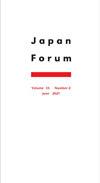Becoming inauthentic: capitalism, commodification, and performance in Wataya risa’s Insutōru
IF 0.2
Q2 AREA STUDIES
引用次数: 0
Abstract
Abstract Asako, the protagonist of Wataya Risa’s 2004 novel Insutōru (Install), is a seventeen-year-old high school student who becomes fed up with the unrelieved sameness of late capitalist Japan. She is intensely aware of the value capitalist society places on her body, bearing as it does the desirable ‘brand’ of joshikōsei (female high-school student). As an act of defiance she stops attending school and throws away all her belongings and furniture, becoming a kind of hikikomori in order to remove herself from alienating Japanese society and capitalist mediation of her body and find some kind of authenticity. However, she comes to the realization that late capitalism is exitless, and her rebellion is doomed to failure. Salvation comes from an unlikely source: a neighbor elementary-school student who introduces her to a part-time job selling chatroom ‘sex’ on the internet. This paper argues that it is precisely the move into a social environment that is highly anonymized and heavily mediated by capital that allows Asako to come to terms with society. Online she plays the role of a 26-year-old housewife, allowing her to perform a different and adult femininity. Asako realizes that both capitalism’s discipline of her productivity and patriarchal society’s discipline of her body into a valuable commodity can be satisfied by inauthentic performance. In the end, Asako overcomes her angst by giving up on the need to discipline her authentic self into someone that can be accepted by a community or society that will provide meaning. Instead, she realizes that all of her interactions with friends, teachers, and society as a whole can be mere transactional performances. For Asako this is a kind of liberation, as she need only perform for society rather than discipline herself to become an authentic member of it.变得不真实:资本主义、商品化和Wataya risa的Insutōru中的表现
Wataya Risa 2004年的小说《Insutōru》(安装)的主人公Asako是一名17岁的高中生,他厌倦了晚期资本主义日本的一成不变。她强烈意识到资本主义社会对她身体的重视,同时也带着joshikōsei(女高中生)令人向往的“品牌”。作为一种反抗行为,她停止了上学,扔掉了所有的物品和家具,成为了一种hikikomori,以摆脱对日本社会的疏远和资本主义对她的身体的调解,并找到某种真实性。然而,她意识到晚期资本主义是没有流亡者的,她的反抗注定会失败。救赎来自一个不太可能的来源:一位邻居小学生向她介绍了一份在互联网上销售聊天室“性”的兼职工作。本文认为,正是进入了一个高度匿名化和资本高度中介的社会环境,才让浅子能够接受社会。在网上,她扮演一个26岁的家庭主妇,让她展现出一种不同的成人女性气质。Asako意识到,资本主义对她的生产力的约束和父权社会对她的身体成为有价值商品的约束都可以通过不真实的表现来满足。最终,Asako克服了她的焦虑,放弃了将真实的自己训练成一个可以被社区或社会接受的人,从而提供意义的需要。相反,她意识到,她与朋友、老师和整个社会的所有互动都可能只是交易性的表现。对Asako来说,这是一种解放,因为她只需要为社会表演,而不需要约束自己,成为社会中真正的一员。
本文章由计算机程序翻译,如有差异,请以英文原文为准。
求助全文
约1分钟内获得全文
求助全文

 求助内容:
求助内容: 应助结果提醒方式:
应助结果提醒方式:


